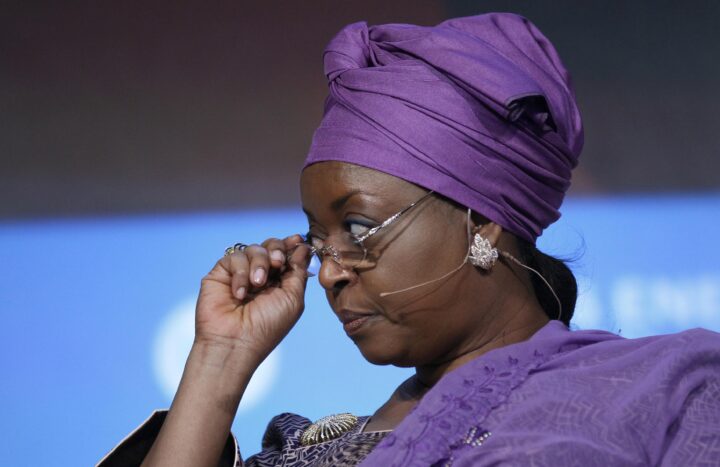
Nigeria's former Petroleum Minister, Diezani Alison-Madueke adjusts her glasses at the annual IHS CERAWeek conference in Houston, Texas March 4, 2014. REUTERS/Rick Wilking (UNITED STATES - Tags: BUSINESS ENERGY POLITICS)
Nigeria to spend recovered money from Diezani on rural electrification
About 45% of Nigerians do not have access to electricity. The government plans to power rural communities with funds recovered from a former oil minister and her associates
On Friday, the government announced that millions in recovered funds linked to former Petroleum Resources Minister Diezani Alison-Madueke will be used to fund rural electrification projects across Nigeria. The announcement followed the signing of an Asset Return Agreement between Nigeria and the United States which enables the US to return nearly $52.9 million (€51.6 million) seized from the forfeiture of assets belonging to the former minister and her associates.
The agreement is significant in that it is the first repatriation of assets to Nigeria linked to Alison-Madueke. She was Nigeria’s oil minister from 2010 to 2015 and became the first female president of the oil alliance OPEC.
Nigerian Justice Minister Lateef Fagbemi said the recovered funds were an example of the countries’ unwavering commitment to fighting corruption. He added that “it also signifies the commitment of the United States of America to facilitating restitution and supporting integrity and accountability in governance.”
Lucrative contracts
In 2017, a civil complaint filed by the US Department of Justice requested the recovery of over $100 million (€97 million) in assets suspected of being obtained through bribes to the former minister for petroleum resources. The lawsuit alleged that between 2011 and 2015, two Nigerian businessmen conspired with others to bribe the former oil minister, who oversaw the country’s state-owned oil company NNPC Ltd. In return, the minister is said to have used her position in office to steer lucrative oil contracts to companies owned by the two businessmen.
According to court documents, proceeds from those illicitly obtained contracts were laundered through the United States and used to buy various assets via shell companies, including luxury properties in California and New York, as well as a 65-meter (214.5-foot) superyacht.
Alison-Madueke, who was minister for petroleum resources during the presidency of Goodluck Jonathan, has denied allegations of corruption. However, Nigeria’s anti–graft agency has obtained court orders to seize houses, cars and jewelry in Nigeria, which it claims were proceeds of corruption connected to the former minister and her associates, according to the Associated Press.
The corruption challenge
Despite a projected economic growth rate of 3.7% in 2024, according to the African Development Bank, most countries continue to grapple with extreme poverty. As of 2024, an estimated 464 million people in Sub-Saharan Africa alone live in extreme poverty, according to the World Bank. The economic situation is the result of decades of severe underfunding in critical public sectors, exacerbated by corruption and illicit financial flows which siphon public funds and resources away from citizens.
Nigeria is rife with corruption. A 2023 report by the country’s statistics agency, NBS, ranked corruption as the fourth-most significant problem affecting the country. Following shortly after, were other challenges including high living costs and rampant unemployment. In 2023 alone, about N721 billion (€451 million) was paid in cash bribes to public officials in the country.
Analysts are quick to point out that corruption could cost Nigeria up to 37 percent of its gross domestic product by 2030 if it is not adequately tackled.
Nigerian Justice Minister Lateef Fagbemi mentioned that diplomatic efforts such as the agreement between the United States and Nigeria highlight the “importance of international cooperation in addressing the global scourge of corruption, which is also linked to trans-border crimes.” He also pointed out that it “underscores the obligations and commitments enshrined in the United Nations Convention against Corruption (UNCAC) and the Proceeds of Crime (Recovery and Management) Act , which guide our collective efforts to ensure that stolen assets are returned and used for the benefit of our citizens.”
Funds bring light to rural communities
Nigeria has the world’s largest deficit when it comes to access to electricity, according to the World Bank, with 45% of Nigerians cut off from power. An even grimmer disparity exists between urban and rural areas. Only 26 percent of rural Nigeria is connected to the electricity grid.
Since President Bola Tinubu assumed office in May 2023, he has taken on various initiatives aimed at bridging the electricity gap and introducing economic activities in rural communities. Earlier last December, German President Frank-Walter Steinmeier made a state visit to Nigeria to bolster energy ties between the two countries.
Justice Minister Fagbemi said the recovered funds would be used to support rural electrification through the World Bank, with $50 million earmarked for improving access to renewable energy in Nigeria’s rural communities.
Fagbemi said the remaining nearly $2.9 million would be disbursed as a grant by Nigeria to the International Institute for Justice to support counterterrorism measures across Africa.
The justice minister said measures had been put in place to ensure that the returned funds are not only disbursed but also “utilized transparently and accountably by the World Bank and IIJ, with periodic reports to be forwarded to Nigeria and the US on the implementation of the projects.”
Source: DW
